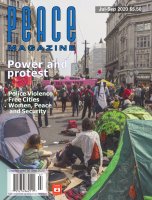
Peace Magazine Jul-Sep 2020, page 5. Some rights reserved.
Canada was a trailing third compared to Norway and Ireland although more than half the world thought Canada deserved a fighting chance (108 votes). What were key hurdles we faced?
Canada proportionately gives less in Overseas Development Aid than either of its competitors in the “Western European and Other” (WEO) region, although in absolute dollars Canada gives about four times what Ireland offers, and only slightly less than what Norway contributes.
The Canadian government boasts: “More than 125,000 Canadians have served abroad in support of UN peacekeeping operations.” While true, and despite promises to provide 600-plus personnel and a rapid deployment capability, we provide a paltry 34. Once, Canada contributed to every mission, and in our heyday, 1993, we put at least 3,300 people into UNPK uniform, 100 times what we offer now.
We violate the arms trade treaty’s foundational principles by selling weapons to Saudi Arabia, one of the globe’s worst human rights violators, and a regime which is directly involved in a horrific conflict in Yemen.
Canada once pushed the idea of a permanent UN Emergency Peace Service, an early-in, early-out capability that has yet to come to life. Prime Minister Justin Trudeau also promised a modest rapid reaction unit but did not deliver.
Canada voted only once in favour of Palestinians’ right to self determination (in late 2019), but has been avoiding the 16 recurrent UN General Assembly resolutions that relate to the status of Jerusalem, Palestinian sovereignty and settlements. These are resolutions we used to generally support. As bad, Canada has been opposing Palestine’s status at the International Criminal Court (ICC), arguing “Palestine is not a state.”
This country is presumed to be in a difficult position with the US monolith in its shadow, always. But with the erratic, America-Firster President Trump installed, we appear to have slid back further on our heels. As Ian Davis illustrates in a recent edition of NATO Watch:
“[Trump] has pulled the United States out of the Paris climate agreement, the INF Treaty and the Iran nuclear deal, unsigned the Arms Trade Treaty, abandoned the landmine ban, threatened to undertake the first nuclear weapon tests in America since 1992, contemplated cutting funding to the World Health Organization and then announced withdrawal from it, set in motion withdrawal from the Open Skies Treaty, and imposed sanctions against ICC officials in response to ongoing ICC investigations into alleged US war crimes in Afghanistan.”
Canada has a contrary position on all of these American transgressions but has been mostly mute. That is not evidence of high quality Security Council material. Instead:
Robin Collins, Ottawa
No one was ready for what we are going through right now, not the most powerful leaders nor the most helpless people. But look at us now, finally uniting in the name of humanity. We are all vulnerable to a power stronger than any of us will ever be. World leaders are no longer the ones choosing who gets to live and who doesn’t. This is not another decision about which country to bombard or which population to silently eliminate. All lives are at stake now, and no amount of money can buy anyone their way out.
Before the pandemic and until today, millions of people have been living in extreme poverty, and others have been seeing their homes turn into war zones. This misery rarely seemed to bother anyone until today, when marginalized societies are no longer the only ones suffering, but rich and highly- developed ones are as well.
Since then, the safety and the well-being of humanity have become the world’s top priorities. It’s time to speak up for ourselves and for those who can’t. We are all part of everything right and wrong in this world.
Mané Djizmedjian, Cairo